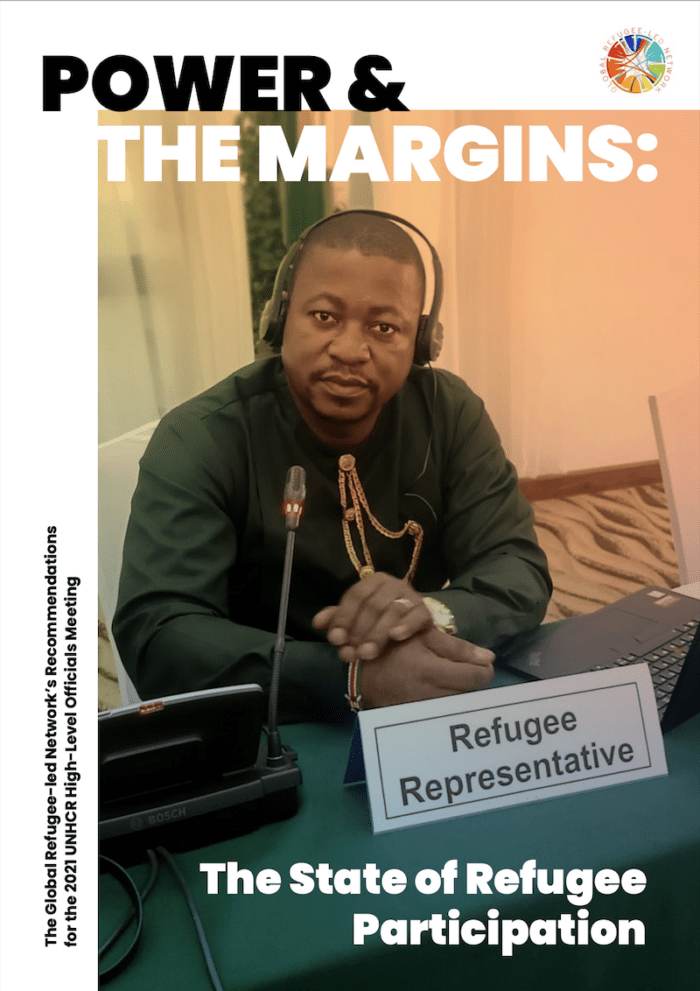Published by the Global Refugee-Led Network and written by Global Independent Refugee Women Leaders (GIRWL) Co-founders Shaza Alrihawi, Anila Noor and Najeeba Wazefadost, with John Bolingo Ntahira and Christa Kuntzelman.
With few exceptions, refugees have historically been excluded from systematic and meaningful inclusion in high-level governance areas of policy- and decision-making (Harley 2021). The exclusion of refugees and other forcibly displaced people matters because these governance processes significantly impact the daily life of the over 34 million displaced persons currently under UNHCR’s mandate for protection (UNHCR 2021a). These processes determine refugees’ rights, and the material distribution they access, as well as critically secure durable solutions that end their displacement (Arnold-Fernández 2019). Despite these high stakes, decision makers have
often considered refugees as too vulnerable (Sigona 2014), unskilled, or otherwise unable to participate in decision making (Barnett 2011, Tsion-Abebe 2021). In this working paper, we underscore that refugee-led initiatives and refugee-led efforts are debunking these outdated and inaccurate assumptions. To wit, we evidence that refugee efforts — including efforts by this paper’s co-authors who are founding members of the Global Refugee-Led Network (GRN) — are steadfastly driving the change from exclusion to inclusion.
In part, recognition of refugee-led efforts is observed in shifting global policy frameworks and in academic literature that highlights the normative and instrumental rationale for direct refugee participation. Chiefly, the 2016 New York Declaration for Refugees and Migrants and the 2018 Global Compact on Refugees (GCR) affirm an international com- mitment to recognize displaced persons as participatory stakeholders (Harley and Hobbs 2020). Moreover, scholars identify how direct refugee participation can empower refugees, as well as result in more appropriate and effective interventions (Badran 2019, Jones 2019). Scholars also emphasize the merit and tangible effects of refugee-led initiatives to provide social protection and material provision (Alio et al 2020, Pincock et al 2020a, Kuntzelman and Hakiza 2021), and to provide rights-based and protection knowledge to other displaced people including during the Covid-19 pandemic (Chandiga Justine 2020, Lau 2021). This burgeoning literature further captures how refugee-led organizations (RLOs) and networks are expanding beyond the local community level to advocate at the national, regional, and international levels (Pincock et al 2020b). Significantly, NGOs, researchers, and research institutions are following suit by making pledges and taking strategic actions to expand the breadth and depth of multi-sectoral refugee participation (United Nations 2019, Shivakoti and Milner, 2020, Kuntzelman 2021).
As leaders from the Global Refugee-Led Network (GRN), we draft this report ahead of the 2021 High-Level Officials Meeting (HLOM) because the HLOM represents an ideal time to reflect on the global progress made towards refugee inclusion and participation since the 2019 Global Refugee Forum, and ahead of the 2023 Global Refugee Forum. We believe there is an urgent need for refugee leadership and the inclusion of new voices given the dearth of durable solutions, the global increase in displacement numbers, and the projections of further displacement due to unmitigated global conflict and emerging challenges such as climate change (UNHCR 2021b). Acknowledging the challenges and opportunities, now is an apt time to renew global commitments to recognize, strengthen, expand, and honor refugee efforts.
The report is structured around the GRN’s primary objectives to
(i) Increase refugee participation in shaping policies,
(ii) Build refugee capacity to engage locally, nationally, regionally, and globally, and
(iii) Strategically advocate for and promote inclusive human rights approaches to forced displacement.
It concludes with concrete recommendations for the international community to consider during the HLOM, and to prioritize ahead of the 2023 GRF.
